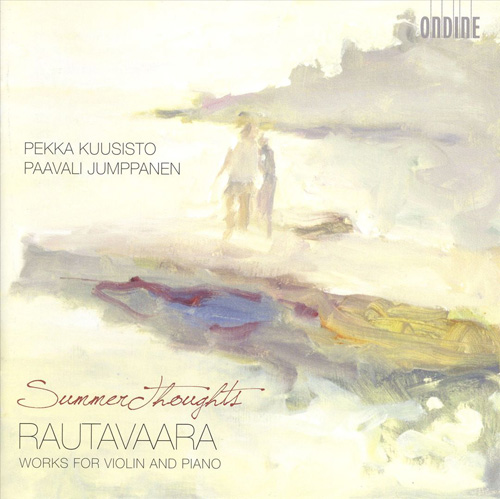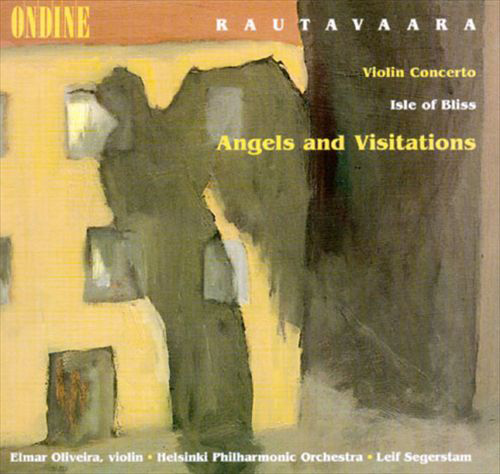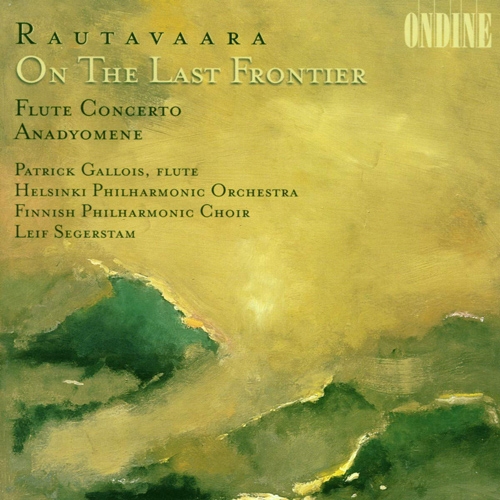Since Einojuhani Rautavaara is still actively composing, it might seem premature to label a collection his Complete Works for Male Chorus, but there is already enough material to fill out two CDs. Rautavaara is an exceptionally prolific composer, and he has been writing for men's voices since early in career; the pieces collected here span more than 50 years. The composer is a master of graceful choral writing; each piece is put together with skill and imagination. It's unfortunate that the pieces aren't presented in chronological order, since it would have been helpful to hear the composer's growth. As it is, this ordering tends to homogenize the impression of Rautavaara's styles, and while his versatility is evident from piece to piece, and individual works are striking, it's easy for a sense of monotony to set in over the course of the nearly 100 minutes of music. The composer favors dense textures and the unrelenting sound of massed a cappella low voices over such a long time tends to dull the ear and makes it easy to miss the felicities of individual works. The pieces with sections for a solo voice stand out dramatically for the textural contrast they provide. The best way to appreciate these works would be to savor a few at a time. The YL Male Voice Choir, led by Matti Hyökki, and the Talla Vocal Ensemble, led by Pasi Hyökki, sing with excellent intonation and blend, and their tone is rounded and full. Ondine's sound is present and warm; it's hard to know whether or not the engineers could have done anything to alleviate the darkness of such bass-heavy repertoire. Stephen Eddins
Tracklist & Credits :
31.8.24
RAUTAVAARA : Complete Works for Male Choir (YL Male Voice Choir · Talla Vocal Ensemble · Matti & Pasi Hyökki) 2CD (2008) FLAC (tracks+.cue) lossless
13.2.22
12.2.22
RAUTAVAARA : Before the Icons; A Tapestry of Life (Leif Segerstam) (2010) FLAC (tracks+.cue), lossless

RAUTAVAARA : 12 Concertos (2009) 4xCD BOX-SET / FLAC (tracks+.cue), lossless
This four-disc Ondine set collects the complete concertos of Einojuhani Rautavaara. While these 12 works may not make the best argument for the Finnish post-modernist's status as a great composer -- his eight symphonies surely make good that claim -- they certainly make the best argument for his status as an amazingly effective, astoundingly diverse, and wonderfully individualistic composer. The works themselves are all from Rautavaara's wide-ranging maturity. There are three piano concertos, one concerto each for violin, cello, double bass, flute, clarinet, organ, and harp, as well as a Ballad for harp and orchestra, plus the sui generic "Cantus Arcticus" for taped Artic bird songs and orchestra. Though the majority of the works are in three movements, each is unlike any other in conception and execution. From the megalomaniacal Piano Concerto No. 1 through the atmospheric Flute Concerto "Dances of the Winds" to the luminous Bass Concerto "Angel of Dusk," Rautavaara never repeats himself. Each work is superbly composed for its chosen soloist; the nearly Romantic Piano Concerto No. 3, "Gift of Dreams," written for Vladimir Ashkenazy, is a prime example. The soloists are always technically impressive, particularly Patrick Gallois' virtuosity on four separate flutes. They are also often emotionally compelling, especially Elmar Oliveira's seamless legato in the Tranquillo that opens the Violin Concerto. Recorded in cool, clear, deep, and very vivid digital sound, this set deserves to be heard by fans of the best of post-modernism. by James Leonard
RAUTAVAARA : The 8 Symphonies (2009) 4xCD / FLAC (tracks+.cue), lossless

RAUTAVAARA : Kaivos (The Mine) (Hannu Lintu) (2011) FLAC (image+.cue), lossless

RAUTAVAARA - Summer Thoughts : Works for Violin and Piano (Kuusisto, Jumppanen) (2011) FLAC (image+.cue), lossless

RAUTAVAARA : Marjatta (Tapiola Children's Choir) (2011) FLAC (image+.cue), lossless

RAUTAVAARA : Modificata; Incantations; Toward the Horizon (Colin Currie, Truls Mørk, John Storgårds) (2012) FLAC (tracks+.cue), lossless

All Tracks & Creditas
RAUTAVAARA : Choral Works (Finnish Radio Chamber Choir, Timo Nuoranne) (2017) 4CD-BOX-SET / FLAC (tracks+.cue), lossless

Credits :
Baritone Vocals – Petteri Salomaa (tracks: 1-1 to 1-34)
Bass Vocals – Jyrki Korhonen (tracks: 1-1 to 1-34)
Choir – Finnish Philharmonic Chorus, Finnish Radio Chamber Choir
Composed By – Einojuhani Rautavaara
Conductor – Eric-Olof Söderström, Leif Segerstam, Timo Nuoranne
Mezzo-soprano Vocals – Lilli Paasikivi (tracks: 1-1 to 1-34)
Orchestra – Helsinki Philharmonic Orchestra, Finnish Radio Symphony Orchestra
Soprano Vocals – Pia Freund (tracks: 1-1 to 1-34)
Tenor Vocals – Topi Lehtipuu (tracks: 1-1 to 1-34)
+ last month
FRANKIE "Half-Pint" JAXON — Complete Recorded Works In Chronological Order Volume 3 · 1937-1940 (1994) FLAC (tracks+.cue), lossless
After cutting records with the Harlem Hamfats in Chicago during the years 1937 and 1938, Frankie "Half Pint" Jaxon made his final ...





































.jpg)
.jpg)



